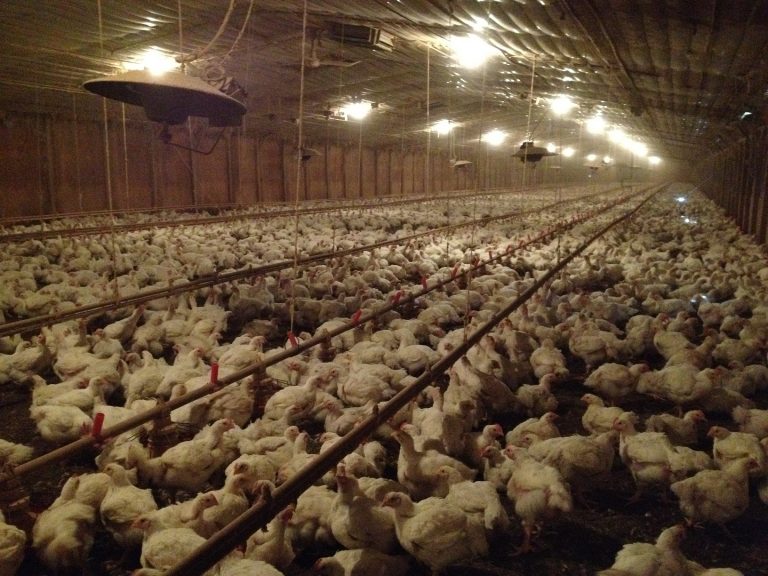Alt Health Works: Whistleblower Sues Second Biggest U.S. Poultry Co., Alleges They Turn Family Farmers Into “Sharecroppers”
by Nick Meyer | December 27, 2018
In many of the world’s longest living cultures, meat is eaten far less than in mainstream society, usually just once or twice a week in stews with vegetables.
But in today’s modern world, meat is an everyday thing, giving rise to a system of factory farms and corporations that have been preying on family farmers for decades while producing low quality meat that is damaging to our health and the environment.
One of the biggest examples according to films like ‘Food, Inc.’ is the system of “contract farming,” in which these mega corporations scoop up family farms of all sizes, controlling all of the inputs including food and animals.
This leads to an imbalanced system where rules and regulations are routinely broken, critics say, and many farmers are being saddled with crippling debt, forced out of business and unable to speak out for fear of the consequences.
Now, one farmer is suing America’s second largest poultry corporation, claiming that he was retaliated against after blowing the whistle on industry injustices at a hearing in 2010. The farmer is seeking justice for what the Food Integrity Campaign called a “system of de facto sharecroppers” among the conventional chicken industry.
Lawsuit Aims to Expose Second Largest Chicken Corporation
The lawsuit, filed in late October by the Government Accountability Project, was announced against the Pilgrim’s Pride chicken company on behalf of Eric Hedrick and his business, Trip R. Ranch, LLC.
Pilgrim’s Pride is the producer of the following brands: Pilgrim’s Chicken, Just BARE Chicken, Gold n’ Plump, Moy Park, Country Pride Chicken, Del Dia, Pierce Chicken, Gold Kist, Savoro, To-Rico’s, and O’Kane.
Hedrick alleges that he experienced retaliation by receiving a lesser quality of birds (including being given diseased chicks) from the company along with other forms of abuse, including receiving moldy feed, that caused him to go $1,500 into debt. He believes this was done because of his whistleblowing at a 2010 government hearing.
The complaint says Pilgrim’s is in violation of the Agricultural Fair Practices Act.“We are filing this suit in hopes that the courts will recognize the abuses suffered by farmers at the hands of corporate agriculture,” he said. “If this is not done there will be no future for farmers in this country. We hope no one else has to suffer the financial and (emotional) losses we have suffered.”
Hedrick is considered to be an “independent” contract farmer, but Pilgrim’s is the entity that ultimately has almost full control.
“In this model, companies control all of the inputs, including the food and animals,” the press release states.
“The farmers who ‘grow’ the animals for the company are paid a pittance for the flock yield and often go into debt trying to meet firms’ strict demands,” it continues. “With no power to negotiate, contract farmers have little to no say about how their operations are run, and it’s especially risky for them to speak out when they have concerns. Indeed, companies like Pilgrim’s turn farmers like Hedrick into de facto sharecroppers.”
Pilgrim’s Pride issued the following statement to Bloomberg.
“Pilgrim’s strongly denies the allegations and looks forward to defending our interests,” company spokesman Cameron Bruett said.
Hedrick’s complaint echoes similar ones from family farmer whistleblowers across the country, highlighting accusations against non-organic and factory farming corporations like Perdue and Pilgrim’s Pride.
In 2016, an American farmer Craig Watts went on video with RT to expose what he called “meaningless” labeling claims on chickens from Perdue, including “antibiotic-free” and “hormone-free.”
Watts is a contract farmer like Hedrick.
“They are putting stuff on labels and putting stuff in advertisements that is so far removed from what is actually happening in those barns,” Watts added (see the video below), while leaving viewers with a famous quote from Henry Kissinger on the state of the food system: “Control the food and you control the people.”
How to Support the Transition to a Better Farming System
Regardless of whether you eat meat or not, there are far better agricultural methods that support the health of both animals and land, including regenerative agriculture, a technique being promoted by the Organic Consumers Association that could become a chemical-free, planet-wide solution to soil health, deforestation, excess carbon in the atmosphere, and more.
While regenerative agriculture is still a ways off from putting a dent in our destructive system of factory farms, GMOs and soil-destroying pesticides, the powers-that-be are clearly concerned.
A quick Google search for regenerative agriculture brings up “Modern Agriculture,” a buzzword used by Bayer and Monsanto, as the second paid result, just below TrulyGrassFed.com, an Irish group sharing the story of the island’s “forever farms” based on grass-fed animals and regenerative agriculture.
At the end of the day, consumers will decide which model wins out, something to think of the next time you head to the cash register and think about supporting brands like Perdue, Tyson Foods and Pilgrim’s Pride.

